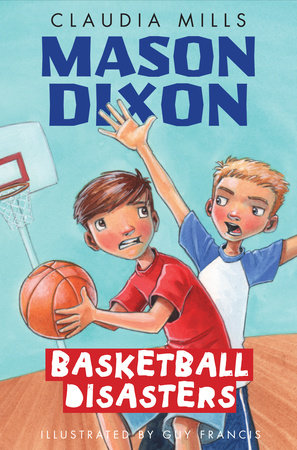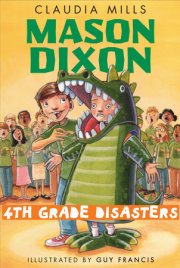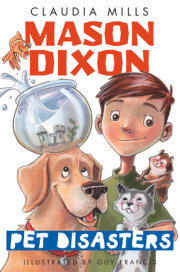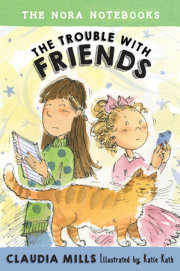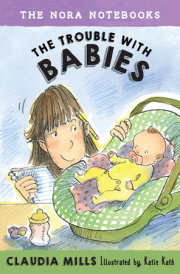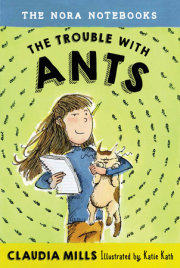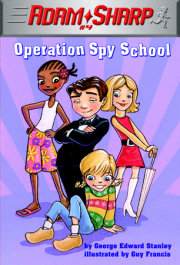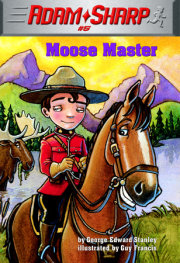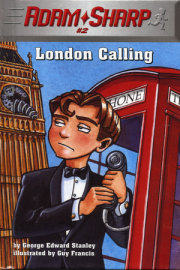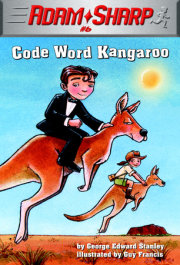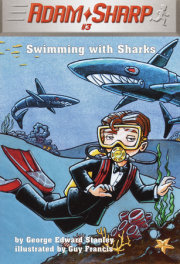1
On the Plainfield Elementary School playground, Mason Dixon watched from a safe distance as his best friend, Brody Baxter, aimed his basketball at the hoop.
At least Mason had thought it was a safe distance.
The ball struck the front of the rim and shot back directly toward Mason’s head.
“Watch out!” Brody shouted.
Mason watched, but didn’t exactly watch out. Instead, he stared with horrified fascination as the ball zoomed toward him. Then, a split second before it would have knocked him to the blacktop--“Fourth-Grade Boy Killed on Basketball Court”--he made a saving catch.
Mason’s golden retriever--named Dog, short for Dog of Greatness--gave an appreciative bark as Mason tossed the basketball back to Brody. Then Dog gave another appreciative bark as Brody caught it. Dog lived at Mason’s house, because Brody’s dad was desperately allergic to all furry pets, but both boys shared Dog and loved him equally.
“Hey, Mason,” Brody said, practically dancing as he dribbled in place beneath the hoop. “You’re good! You have quick reflexes!”
Well, yes, sometimes a person’s reflexes became surprisingly good when the person was facing impending death-by-basketball.
“Come on, Mason, shoot some with me. Dog, you can come and shoot some, too.”
Dog wagged his tail at the sound of his name. Besides, Dog loved playing with a ball, any ball. Despite having only three legs, Dog thought that retrieving balls, or sticks--or any tossed object--was life’s greatest joy.
This was one way in which Mason and Dog were different.
“Did I tell you I talked to my parents?” Brody asked. “I told them I want to try basketball at the YMCA for a season.”
Mason would have guessed this without Brody telling him anything. Of course, Brody would want to try basketball. Brody was interested in trying everything. He was finishing up a short soccer season right now; he’d play baseball in the spring. Why not play basketball, too?
That was one way in which Mason and Brody were different.
It was almost evening, on a mid-October Friday, and the Plainfield Elementary playground was deserted, except for Mason, Brody, and Dog. Neither boy had a basketball hoop on his garage, so this was the perfect place for playing basketball.
If any place was a perfect place for playing basketball.
Mason edged slowly onto the court. Brody took a few more dribbles, and then shot again, and missed again.
“Get the rebound!” Brody called to Mason.
Mason managed to stumble after the ball and grab it before it rolled off into the long grass at the edge of the blacktop. He knew the basic idea of how to play basketball, from playing it for a few weeks each year in P.E., but he had never been good at it, or good at any sport, for that matter.
“Now shoot!”
Without bothering to take careful aim, Mason tossed the ball in the general direction of the hoop.
“You’re not even trying,” Brody scolded. He tossed the ball back to Mason.
This time Mason studied the distance to the hoop before releasing the ball. His eyes widened with disbelief as, without even grazing the rim, the ball sailed neatly through the hoop and into Brody’s waiting hands.
Brody cheered. Mason continued to stare at the hoop.
“Besides, you’re tall,” Brody said as he hugged the ball to his chest. “You’d be good at basketball because you’re tall.”
People often said that to Mason, that he’d be good at basketball because he was tall. They seemed to be forgetting that basketball involved a few other things besides height, such as skill in shooting, passing, dribbling, and guarding. Little things like that.
“I know I’m short,” Brody said as he began dribbling the ball in slow circles around Mason, “but that can be an advantage in basketball.”
Mason didn’t say it, but he couldn’t help thinking: Then why are so many professional basketball players seven feet tall?
“A short guy can dart in and out, and the tall guys won’t even know what’s coming at them.”
Brody assumed a crouching position, as if to block an opponent’s shot.
“But you know the real reason why I’m going to be good at basketball?” Brody asked Mason.
Mason knew Brody wasn’t really bragging. Brody was just so in love with the idea of playing basketball for the first time, and being good at it, great at it, that his enthusiasm bubbled out of him like happy steam from a singing teakettle.
“Why?” Mason asked, because Brody was clearly expecting him to.
“Because I have hustle,” Brody said. “I do. I have hustle.”
Something Mason decidedly didn’t have. And never would have.
“Look,” Brody said as he shot again. This time the ball teetered on the rim and then dropped in. “If you sign up for the team with me, then I’ll have a ride to all the practices and the games.”
“What about your parents? Why can’t they drive you?”
“They told me I’m already doing too many sports this year, and Cammie and Cara are playing basketball, too, and it’s their only sport this year, and so they get priority. That’s what they said.”
Mason let Brody bounce-pass the ball to him, and he took another shot. This time he felt a strange satisfaction in missing, as if his wide shot proved Brody wrong about Mason’s supposedly great potential as a tall player with quick reflexes.
“Um, Brody?” Mason apparently needed to remind him. “I’m not what you would call a sports person.”
“That’s like what you said when we got Dog, remember? That you weren’t a pet person? And now you love Dog.”
Mason tried to hide his scowl. He hated being reminded that he had agreed to adopt Dog a few months ago only because of Brody’s begging and pleading.
“And then you said you didn’t want to be in the Plainfield Platters, remember? You said you weren’t a singing person?”
The Platters were the fourth- and fifth-grade choir at Mason and Brody’s school. Mason had joined it this year, against his will, and he had to admit that it hadn’t been terrible so far. He and Brody had even sung a solo together at the last concert.
Brody went on. “Mason, I really think my parents mean it this time, that I have too many activities and they’re not going to drive me to this one.”
Mason cast about for another way Brody could get his rides. “Does Sheng want to play basketball? Or Julio? Or Alastair?”
Sheng was Brody’s second-best friend. Julio was Brody’s third-best friend. Alastair was Brody’s fourth-best friend.
Brody shook his head for each name. “Either they’re already on another team, or they don’t want to play basketball.”
“But I don’t want to play basketball, either!”
Somehow Mason had already lost the battle.
“Believe me,” Brody said happily, “this is going to be great!”
Mason sighed.
Copyright © 2012 by Claudia Mills. All rights reserved. No part of this excerpt may be reproduced or reprinted without permission in writing from the publisher.

